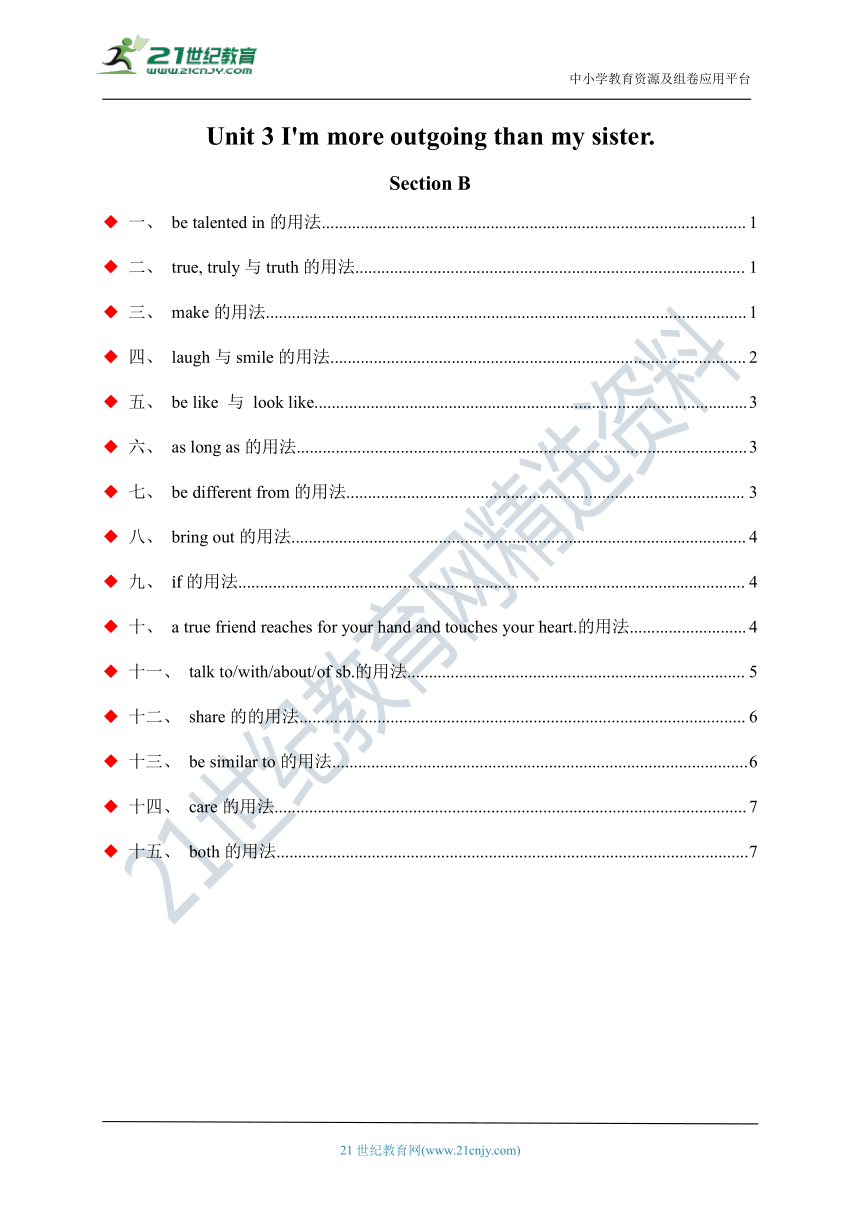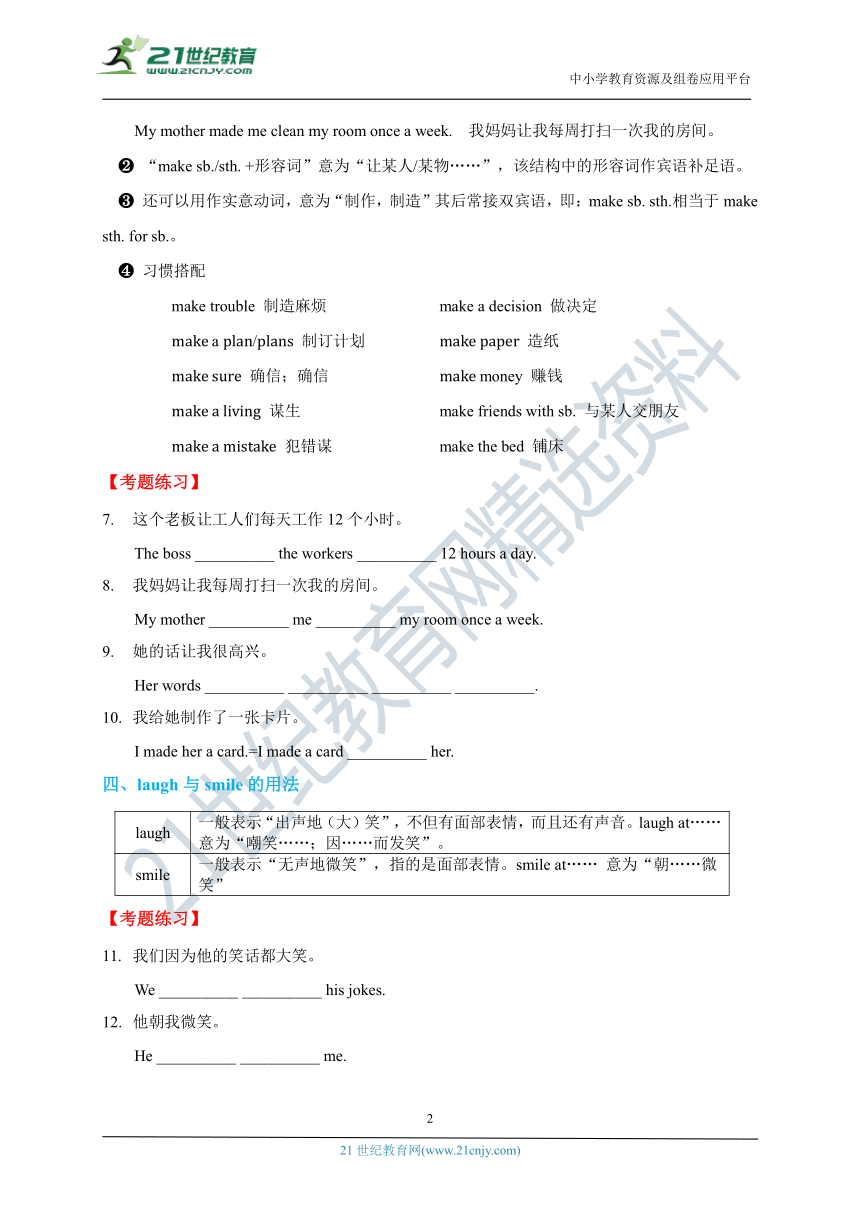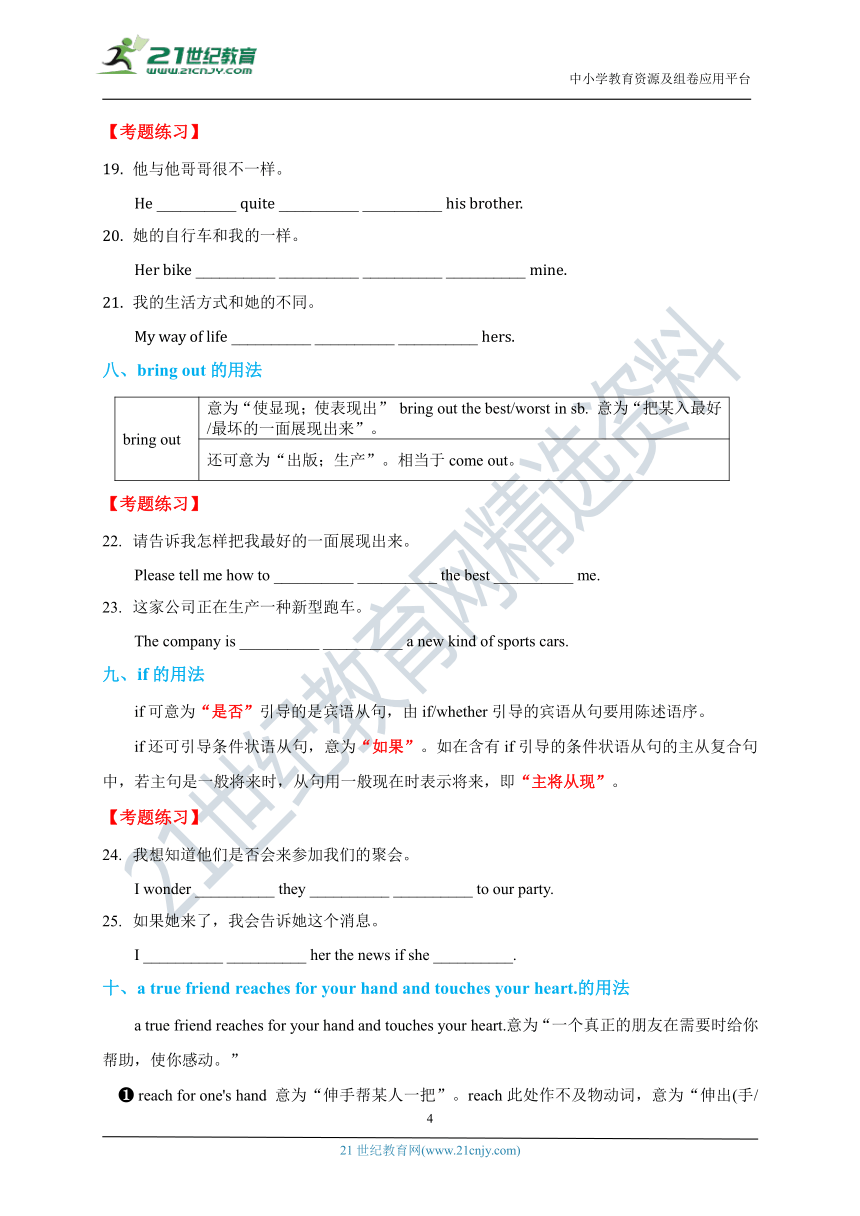Unit 3 I'm more outgoing than my sister Section B 重要知识考点+练习过关 (含答案)
文档属性
| 名称 | Unit 3 I'm more outgoing than my sister Section B 重要知识考点+练习过关 (含答案) |  | |
| 格式 | docx | ||
| 文件大小 | 1019.4KB | ||
| 资源类型 | 试卷 | ||
| 版本资源 | 人教新目标(Go for it)版 | ||
| 科目 | 英语 | ||
| 更新时间 | 2021-09-15 06:52:19 | ||
图片预览





文档简介
Unit
3
I'm
more
outgoing
than
my
sister.
Section
B
一、
be
talented
in的用法
1
二、
true,
truly与truth的用法
1
三、
make的用法
1
四、
laugh与smile的用法
2
五、
be
like
与
look
like
3
六、
as
long
as的用法
3
七、
be
different
from的用法
3
八、
bring
out的用法
4
九、
if的用法
4
十、
a
true
friend
reaches
for
your
hand
and
touches
your
heart.的用法
4
十一、
talk
to/with/about/of
sb.的用法
5
十二、
share的的用法
6
十三、
be
similar
to的用法
6
十四、
care的用法
7
十五、
both的用法
7
中小学教育资源及组卷应用平台
21世纪教育网
www.21cnjy.com
精品试卷·第
2
页
(共
2
页)
21世纪教育网(www.21cnjy.com)
Unit
3
I'm
more
outgoing
than
my
sister.
Section
B
be
talented
in的用法
talent是名词,意为“天才;天资;天赋”,talented形容词,意为“有天赋的,有才能的;有才干的”,常用结构为be
talented
in意为“在某方面有天赋”其后面跟名词/代词/动-ing形式,talented的比较级为
more
talented.
【考题练习】
他是一位天才音乐家。
She
is
a
_______
musician.
这个男孩儿很有舞蹈天赋。
The
boy
_______
_______
_______
dancing.
我弟弟在打篮球方面很有天赋。
My
brother
_______
_______
_______
_______
basketball.
true,
truly与truth的用法
truth
truth为名词,意为“事实,实情”。
true
true为形容词,意为“真实的,真的,符合事实的”。
truly
truly为副词,意为“真正地,确实”,常位于连系动词be、情态动词或助动词之后,实意动词之前。
【考题练习】
我们怎么知道你说的是实话?
How
do
we
know
you’re
telling
the
__________
?
一个好朋友确实关心我。
A
good
friend
__________
cares
about
me.
这是一个真实的故事。
This
is
a
__________
story.
make的用法
?
make可以译为“使,让”,属于使役动词,其用法是“make
+
sb.
+动词原形(省略to的动词不定式)”。这类动词还有:let,have,help,get,keep等。
My
mother
made
me
clean
my
room
once
a
week.
我妈妈让我每周打扫一次我的房间。
?
“make
sb./sth.
+形容词”意为“让某人/某物……”,该结构中的形容词作宾语补足语。
?
还可以用作实意动词,意为“制作,制造”其后常接双宾语,即:make
sb.
sth.相当于make
sth.
for
sb.。
?
习惯搭配
make
trouble
制造麻烦
make
a
decision
做决定
make
a
plan/plans
制订计划
make
paper
造纸
make
sure
确信;确信
make
money
赚钱
make
a
living
谋生
make
friends
with
sb.
与某人交朋友
make
a
mistake
犯错谋
make
the
bed
铺床
【考题练习】
这个老板让工人们每天工作12个小时。
The
boss
__________
the
workers
__________
12
hours
a
day.
我妈妈让我每周打扫一次我的房间。
My
mother
__________
me
__________
my
room
once
a
week.
她的话让我很高兴。
Her
words
__________
__________
__________
__________.
我给她制作了一张卡片。
I
made
her
a
card.=I
made
a
card
__________
her.
laugh与smile的用法
laugh
一般表示“出声地(大)笑”,不但有面部表情,而且还有声音。laugh
at……意为“嘲笑……;因……而发笑”。
smile
一般表示“无声地微笑”,指的是面部表情。smile
at……
意为“朝……微笑”
【考题练习】
我们因为他的笑话都大笑。
We
__________
__________
his
jokes.
他朝我微笑。
He
__________
__________
me.
be
like
与
look
like
be
like
意为“像……一样”,like此处用作介词,意为“像,和……一样”,其反义词是unlike,意为“不像,和……不同”。侧重人的内在气质,如品质、性格、品行等相像。
look
like
意为“看起来像”,侧重人的外貌,如高、矮、胖、瘦等相像。
【考题练习】
凯特像她的妈妈。她们两人都很文静。
Kate
__________
__________
her
mother.
They
are
both
quiet.
凯特看起来像她的妈妈。她们两人都又高又瘦。
Kate
__________
__________
her
mother.
They
are
both
tall
and
thin.
as
long
as的用法
意为“只要……就”,引导条件状语从句,主句是一般将来时或主句谓语含有情态动词can时,as
long
as所引导的条件状语从句应用一般现在时表示将来,即“主将从现”。注意:若表示同级比较,则as
long
as表示
“和…一样长”。
【考题练习】
只要明天天气好,我们就去远足。
_______
_______
_______
the
weather
is
fine
tomorrow,
we
_______
_______
hiking.
只要你努力学习,你就会取得好成绩。
_______
_______
_______
you
study
hard,
you
_______
_______
good
grades.
这支铅笔和那支一样长。
This
pencil
is
_______
_______
_______
that
one.
我的头发与你的头发一样长。
My
hair
is
_______
_______
_______
yours.
be
different
from的用法
difference为可数名词,意为“差别,差异”,其形容诃形式为different,意为“不同的,有差异的”,常用短语be
different
from……,意为“与……不同”。其反义词组为be
the
same
as……,意为“与……一样”。
【考题练习】
他与他哥哥很不一样。
He
__________
quite
__________
__________
his
brother.
她的自行车和我的一样。
Her
bike
__________
__________
__________
__________
mine.
我的生活方式和她的不同。
My
way
of
life
__________
__________
__________
hers.
bring
out的用法
bring
out
意为“使显现;使表现出”
bring
out
the
best/worst
in
sb.
意为“把某入最好/最坏的一面展现出来”。
还可意为“出版;生产”。相当于come
out。
【考题练习】
请告诉我怎样把我最好的一面展现出来。
Please
tell
me
how
to
__________
__________
the
best
__________
me.
这家公司正在生产一种新型跑车。
The
company
is
__________
__________
a
new
kind
of
sports
cars.
if的用法
if可意为“是否”引导的是宾语从句,由if/whether引导的宾语从句要用陈述语序。
if还可引导条件状语从句,意为“如果”。如在含有if引导的条件状语从句的主从复合句中,若主句是一般将来时,从句用一般现在时表示将来,即“主将从现”。
【考题练习】
我想知道他们是否会来参加我们的聚会。
I
wonder
__________
they
__________
__________
to
our
party.
如果她来了,我会告诉她这个消息。
I
__________
__________
her
the
news
if
she
__________.
a
true
friend
reaches
for
your
hand
and
touches
your
heart.的用法
a
true
friend
reaches
for
your
hand
and
touches
your
heart.意为“一个真正的朋友在需要时给你帮助,使你感动。”
?
reach
for
one's
hand
意为“伸手帮某人一把”。reach此处作不及物动词,意为“伸出(手/臂)”。
eg:Can
you
reach
for
my
hand?
你能伸手帮我一下吗?
?
reach还可用作及物动词,意为“到达,抵达”后接地点名词。
?
touch
one's
heart
意为“打动某人的心,令某人感动”,其中touch用作及物动词,意为“感动”。
?
touch用作及物动词,还可意为“触摸”。
?
touch还可用作名词,意为“联系”。keep
in
touch保持联系;get
in
touch取得联系。
【考题练习】
你能伸手帮我一下吗?
Can
you
__________
__________
__________
__________?
他伸手到桌子对面把书拿起来。
He
__________
across
the
table
and
picked
up
the
book.
昨天晚上他到达了广州。
He
__________
Guangzhou
last
night.
这个故事令我感动。
The
story
__________
__________
__________.
不要摸那只狗!很危险。
Don't
__________
the
dog!
It's
dangerous.
我们经常保持联系。
We
often
__________
__________
__________.
talk
to/with/about/of
sb.的用法
talk
to
sb.
“对某人讲话”,侧重于表示一个人对另一个人讲话,但是不表示对方也需要讲话,主要是强调告诉某人什么事,有时指上级对下级,含有“训话”意味,是单向的;
talk
with
sb.
“和某人一起谈论”,双方都要发表言论,相互沟通,双方是互动的。
talk
about
talk
about+谈话内容,宾语可是人,也可是物。意为“谈论,讨论”。
talk
of
talk
of“谈及,谈到”与talk
about同义。只是talk
of仅指“浅谈表面现象(如作者、书名等)。”
【考题练习】
咱们谈论一下我们最喜欢的节目吧。
Let's
__________
__________
our
favorite
programme.
我们经常谈到你。
We
often
__________
__________
you.
我的老师正和我父母谈论我的学习。
My
teacher
is
__________
__________
my
parents
about
my
study.
老师正在对他的同学们讲话。
The
teacher
is
__________
__________
his
students.
share的的用法
可作及物动词,意为“分享,共享;共用,分摊”。常用短语:share
sth.
with
sb.
意为“和某人分享某物”。share还可作名词,表示“一份,(分担的)一部分”。
【考题练习】
对于孩子们来说,学会和朋友们分享他们的想法很有必要。
It's
necessary
for
kids
to
learn
to
__________
their
ideas
__________
friends.
每个人都必须承担自己的那份责任。
Everyone
must
accept
their
__________
of
the
blame(责任).
be
similar
to的用法
similar形容词,意思是“相似的;相仿的”,常与to连用,构成短语be
similar
to意为“与…相像的、类似的”,相当于be
like。
similar
意为“相似的;类似的;相仿的”。
same
意为“相同的,同样的”,前面"前面需加定冠词the。表示“与……相同”时,应用the
same
as……结构。
【考题练习】
这两姐妹看上去很像。
The
two
sisters
look
very
__________.
你的新发型和我的相似。
Your
new
hairstyle
__________
__________
__________
mine.
我们的孩子和他们的孩子上同一所学校。
Our
children
go
to
__________
__________
school
__________
theirs.
care的用法
care做动词时,意为“在意;担忧;关心”,其后可接从句。care
about意为“关心;在意”,后接名词、代词或动词-ing形式。care做名词时,意为“照顾;照看”,take
care
of意为“照顾;处理”。
【考题练习】
我在意他们怎么说。
I
don't
__________
what
they
say.
她其实并不在乎自己的衣服。
She
doesn't
really
__________
__________
her
clothes.
我不在的时候你能照顾我的宠物吗?
Can
you
__________
__________
__________
my
pet
when
I'm
away?
both的用法
?
both可用作形容词和代词,意为“两个;两个都”,通常放在be动词、助动词、情态动词之后,行为动词之前。
?
“both
+of
+复数名词/代词”意为“两个(都)”,此结构做主语
时,谓语动词用复数形式。
?
both…and…连接两个并列成分做主语时,其谓语动词要用复数形式。
【考题练习】
我们都是第一中学的学生。
We
__________
__________
students
from
No.
1
Middle
School.
他们都喜欢踢足球。
They
__________
__________
playing
football.
我们俩都喜欢打鼓。
Both
of
us
__________
playing
the
drums.
萨姆和他哥哥都擅长画画。
Both
Sam
and
his
brother
__________
good
at
drawing.
参
考
答
案
talented
is
talented
in
is
talented
in
playing
truth
truly
true
made/makes;
work
made/makes;
clean
made
me
very
happy
for
laughed/laughs
at
smiled/smiles
at
is
like
looks
like
As
long
as;will
go
As
long
as;will
get
as
long
as
as
long
as
is;
different
from
is
the
same
as
is
different
from
bring
out;
in
bringing
out
if/whether;will
come
will
tell;comes
reach
for
my
hand
reached
reached
touched
my
heart
touch
keep
in
touch
talk
about
talk
of
talking
with
talking
to
share;with
share
similar
is
similar
to
the
same;
as
care
care
about
take
care
of
are
both
both
like
like
are
21世纪教育网(www.21cnjy.com)
3
I'm
more
outgoing
than
my
sister.
Section
B
一、
be
talented
in的用法
1
二、
true,
truly与truth的用法
1
三、
make的用法
1
四、
laugh与smile的用法
2
五、
be
like
与
look
like
3
六、
as
long
as的用法
3
七、
be
different
from的用法
3
八、
bring
out的用法
4
九、
if的用法
4
十、
a
true
friend
reaches
for
your
hand
and
touches
your
heart.的用法
4
十一、
talk
to/with/about/of
sb.的用法
5
十二、
share的的用法
6
十三、
be
similar
to的用法
6
十四、
care的用法
7
十五、
both的用法
7
中小学教育资源及组卷应用平台
21世纪教育网
www.21cnjy.com
精品试卷·第
2
页
(共
2
页)
21世纪教育网(www.21cnjy.com)
Unit
3
I'm
more
outgoing
than
my
sister.
Section
B
be
talented
in的用法
talent是名词,意为“天才;天资;天赋”,talented形容词,意为“有天赋的,有才能的;有才干的”,常用结构为be
talented
in意为“在某方面有天赋”其后面跟名词/代词/动-ing形式,talented的比较级为
more
talented.
【考题练习】
他是一位天才音乐家。
She
is
a
_______
musician.
这个男孩儿很有舞蹈天赋。
The
boy
_______
_______
_______
dancing.
我弟弟在打篮球方面很有天赋。
My
brother
_______
_______
_______
_______
basketball.
true,
truly与truth的用法
truth
truth为名词,意为“事实,实情”。
true
true为形容词,意为“真实的,真的,符合事实的”。
truly
truly为副词,意为“真正地,确实”,常位于连系动词be、情态动词或助动词之后,实意动词之前。
【考题练习】
我们怎么知道你说的是实话?
How
do
we
know
you’re
telling
the
__________
?
一个好朋友确实关心我。
A
good
friend
__________
cares
about
me.
这是一个真实的故事。
This
is
a
__________
story.
make的用法
?
make可以译为“使,让”,属于使役动词,其用法是“make
+
sb.
+动词原形(省略to的动词不定式)”。这类动词还有:let,have,help,get,keep等。
My
mother
made
me
clean
my
room
once
a
week.
我妈妈让我每周打扫一次我的房间。
?
“make
sb./sth.
+形容词”意为“让某人/某物……”,该结构中的形容词作宾语补足语。
?
还可以用作实意动词,意为“制作,制造”其后常接双宾语,即:make
sb.
sth.相当于make
sth.
for
sb.。
?
习惯搭配
make
trouble
制造麻烦
make
a
decision
做决定
make
a
plan/plans
制订计划
make
paper
造纸
make
sure
确信;确信
make
money
赚钱
make
a
living
谋生
make
friends
with
sb.
与某人交朋友
make
a
mistake
犯错谋
make
the
bed
铺床
【考题练习】
这个老板让工人们每天工作12个小时。
The
boss
__________
the
workers
__________
12
hours
a
day.
我妈妈让我每周打扫一次我的房间。
My
mother
__________
me
__________
my
room
once
a
week.
她的话让我很高兴。
Her
words
__________
__________
__________
__________.
我给她制作了一张卡片。
I
made
her
a
card.=I
made
a
card
__________
her.
laugh与smile的用法
laugh
一般表示“出声地(大)笑”,不但有面部表情,而且还有声音。laugh
at……意为“嘲笑……;因……而发笑”。
smile
一般表示“无声地微笑”,指的是面部表情。smile
at……
意为“朝……微笑”
【考题练习】
我们因为他的笑话都大笑。
We
__________
__________
his
jokes.
他朝我微笑。
He
__________
__________
me.
be
like
与
look
like
be
like
意为“像……一样”,like此处用作介词,意为“像,和……一样”,其反义词是unlike,意为“不像,和……不同”。侧重人的内在气质,如品质、性格、品行等相像。
look
like
意为“看起来像”,侧重人的外貌,如高、矮、胖、瘦等相像。
【考题练习】
凯特像她的妈妈。她们两人都很文静。
Kate
__________
__________
her
mother.
They
are
both
quiet.
凯特看起来像她的妈妈。她们两人都又高又瘦。
Kate
__________
__________
her
mother.
They
are
both
tall
and
thin.
as
long
as的用法
意为“只要……就”,引导条件状语从句,主句是一般将来时或主句谓语含有情态动词can时,as
long
as所引导的条件状语从句应用一般现在时表示将来,即“主将从现”。注意:若表示同级比较,则as
long
as表示
“和…一样长”。
【考题练习】
只要明天天气好,我们就去远足。
_______
_______
_______
the
weather
is
fine
tomorrow,
we
_______
_______
hiking.
只要你努力学习,你就会取得好成绩。
_______
_______
_______
you
study
hard,
you
_______
_______
good
grades.
这支铅笔和那支一样长。
This
pencil
is
_______
_______
_______
that
one.
我的头发与你的头发一样长。
My
hair
is
_______
_______
_______
yours.
be
different
from的用法
difference为可数名词,意为“差别,差异”,其形容诃形式为different,意为“不同的,有差异的”,常用短语be
different
from……,意为“与……不同”。其反义词组为be
the
same
as……,意为“与……一样”。
【考题练习】
他与他哥哥很不一样。
He
__________
quite
__________
__________
his
brother.
她的自行车和我的一样。
Her
bike
__________
__________
__________
__________
mine.
我的生活方式和她的不同。
My
way
of
life
__________
__________
__________
hers.
bring
out的用法
bring
out
意为“使显现;使表现出”
bring
out
the
best/worst
in
sb.
意为“把某入最好/最坏的一面展现出来”。
还可意为“出版;生产”。相当于come
out。
【考题练习】
请告诉我怎样把我最好的一面展现出来。
Please
tell
me
how
to
__________
__________
the
best
__________
me.
这家公司正在生产一种新型跑车。
The
company
is
__________
__________
a
new
kind
of
sports
cars.
if的用法
if可意为“是否”引导的是宾语从句,由if/whether引导的宾语从句要用陈述语序。
if还可引导条件状语从句,意为“如果”。如在含有if引导的条件状语从句的主从复合句中,若主句是一般将来时,从句用一般现在时表示将来,即“主将从现”。
【考题练习】
我想知道他们是否会来参加我们的聚会。
I
wonder
__________
they
__________
__________
to
our
party.
如果她来了,我会告诉她这个消息。
I
__________
__________
her
the
news
if
she
__________.
a
true
friend
reaches
for
your
hand
and
touches
your
heart.的用法
a
true
friend
reaches
for
your
hand
and
touches
your
heart.意为“一个真正的朋友在需要时给你帮助,使你感动。”
?
reach
for
one's
hand
意为“伸手帮某人一把”。reach此处作不及物动词,意为“伸出(手/臂)”。
eg:Can
you
reach
for
my
hand?
你能伸手帮我一下吗?
?
reach还可用作及物动词,意为“到达,抵达”后接地点名词。
?
touch
one's
heart
意为“打动某人的心,令某人感动”,其中touch用作及物动词,意为“感动”。
?
touch用作及物动词,还可意为“触摸”。
?
touch还可用作名词,意为“联系”。keep
in
touch保持联系;get
in
touch取得联系。
【考题练习】
你能伸手帮我一下吗?
Can
you
__________
__________
__________
__________?
他伸手到桌子对面把书拿起来。
He
__________
across
the
table
and
picked
up
the
book.
昨天晚上他到达了广州。
He
__________
Guangzhou
last
night.
这个故事令我感动。
The
story
__________
__________
__________.
不要摸那只狗!很危险。
Don't
__________
the
dog!
It's
dangerous.
我们经常保持联系。
We
often
__________
__________
__________.
talk
to/with/about/of
sb.的用法
talk
to
sb.
“对某人讲话”,侧重于表示一个人对另一个人讲话,但是不表示对方也需要讲话,主要是强调告诉某人什么事,有时指上级对下级,含有“训话”意味,是单向的;
talk
with
sb.
“和某人一起谈论”,双方都要发表言论,相互沟通,双方是互动的。
talk
about
talk
about+谈话内容,宾语可是人,也可是物。意为“谈论,讨论”。
talk
of
talk
of“谈及,谈到”与talk
about同义。只是talk
of仅指“浅谈表面现象(如作者、书名等)。”
【考题练习】
咱们谈论一下我们最喜欢的节目吧。
Let's
__________
__________
our
favorite
programme.
我们经常谈到你。
We
often
__________
__________
you.
我的老师正和我父母谈论我的学习。
My
teacher
is
__________
__________
my
parents
about
my
study.
老师正在对他的同学们讲话。
The
teacher
is
__________
__________
his
students.
share的的用法
可作及物动词,意为“分享,共享;共用,分摊”。常用短语:share
sth.
with
sb.
意为“和某人分享某物”。share还可作名词,表示“一份,(分担的)一部分”。
【考题练习】
对于孩子们来说,学会和朋友们分享他们的想法很有必要。
It's
necessary
for
kids
to
learn
to
__________
their
ideas
__________
friends.
每个人都必须承担自己的那份责任。
Everyone
must
accept
their
__________
of
the
blame(责任).
be
similar
to的用法
similar形容词,意思是“相似的;相仿的”,常与to连用,构成短语be
similar
to意为“与…相像的、类似的”,相当于be
like。
similar
意为“相似的;类似的;相仿的”。
same
意为“相同的,同样的”,前面"前面需加定冠词the。表示“与……相同”时,应用the
same
as……结构。
【考题练习】
这两姐妹看上去很像。
The
two
sisters
look
very
__________.
你的新发型和我的相似。
Your
new
hairstyle
__________
__________
__________
mine.
我们的孩子和他们的孩子上同一所学校。
Our
children
go
to
__________
__________
school
__________
theirs.
care的用法
care做动词时,意为“在意;担忧;关心”,其后可接从句。care
about意为“关心;在意”,后接名词、代词或动词-ing形式。care做名词时,意为“照顾;照看”,take
care
of意为“照顾;处理”。
【考题练习】
我在意他们怎么说。
I
don't
__________
what
they
say.
她其实并不在乎自己的衣服。
She
doesn't
really
__________
__________
her
clothes.
我不在的时候你能照顾我的宠物吗?
Can
you
__________
__________
__________
my
pet
when
I'm
away?
both的用法
?
both可用作形容词和代词,意为“两个;两个都”,通常放在be动词、助动词、情态动词之后,行为动词之前。
?
“both
+of
+复数名词/代词”意为“两个(都)”,此结构做主语
时,谓语动词用复数形式。
?
both…and…连接两个并列成分做主语时,其谓语动词要用复数形式。
【考题练习】
我们都是第一中学的学生。
We
__________
__________
students
from
No.
1
Middle
School.
他们都喜欢踢足球。
They
__________
__________
playing
football.
我们俩都喜欢打鼓。
Both
of
us
__________
playing
the
drums.
萨姆和他哥哥都擅长画画。
Both
Sam
and
his
brother
__________
good
at
drawing.
参
考
答
案
talented
is
talented
in
is
talented
in
playing
truth
truly
true
made/makes;
work
made/makes;
clean
made
me
very
happy
for
laughed/laughs
at
smiled/smiles
at
is
like
looks
like
As
long
as;will
go
As
long
as;will
get
as
long
as
as
long
as
is;
different
from
is
the
same
as
is
different
from
bring
out;
in
bringing
out
if/whether;will
come
will
tell;comes
reach
for
my
hand
reached
reached
touched
my
heart
touch
keep
in
touch
talk
about
talk
of
talking
with
talking
to
share;with
share
similar
is
similar
to
the
same;
as
care
care
about
take
care
of
are
both
both
like
like
are
21世纪教育网(www.21cnjy.com)
同课章节目录
- Unit 1 Where did you go on vacation?
- Section A
- Section B
- Unit 2 How often do you exercise?
- Section A
- Section B
- Unit 3 I'm more outgoing than my sister.
- Section A
- Section B
- Unit 4 What's the best movie theater?
- Section A
- Section B
- Unit 5 Do you want to watch a game show?
- Section A
- Section B
- Unit 6 I'm going to study computer science.
- Section A
- Section B
- Unit 7 Will people have robots?
- Section A
- Section B
- Unit 8 How do you make a banana milk shake?
- Section A
- Section B
- Unit 9 Can you come to my party?
- Section A
- Section B
- Unit 10 If you go to the party, you'll have a grea
- Section A
- Section B
